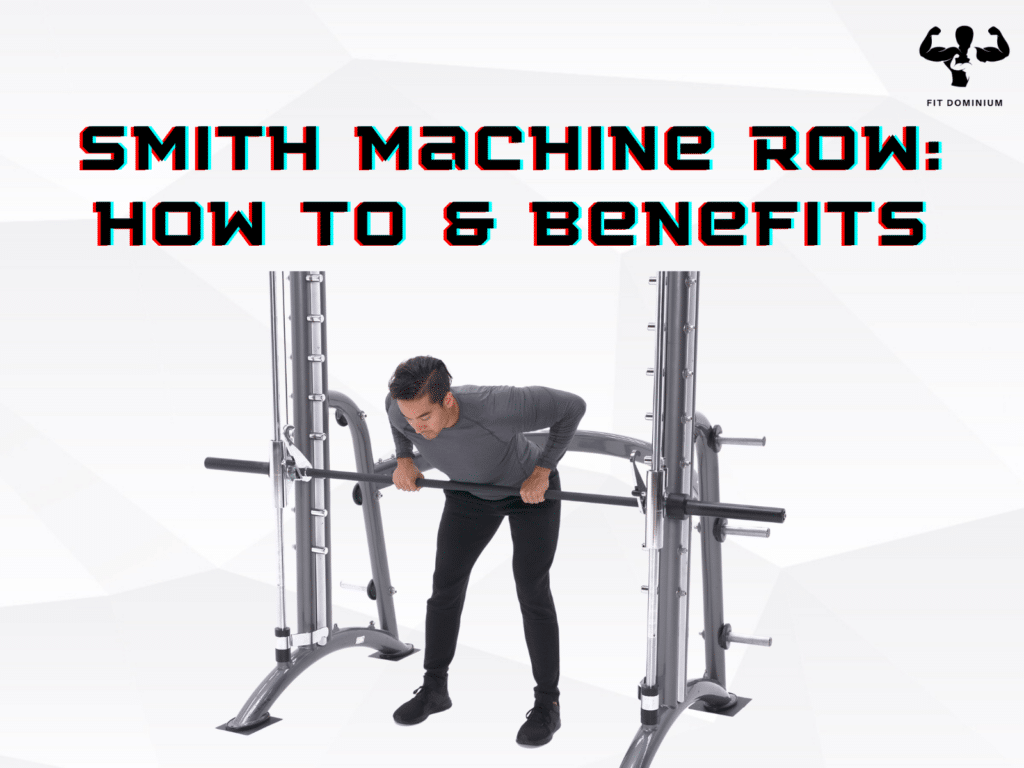
When people talk about Smith Machine rows, they usually talk about the bent-over version. Why bent over, you ask? Well, it’s all about getting those elbows behind your back correctly. This move helps you engage your lats like a pro.
But here’s the deal: range of motion matters big time here. Rows can be a bit tricky. If you don’t do them just right, your lats and other back muscles might not get the memo.
So, what does the Smith Machine Row do for you? It’s like an all-star team workout for your lats, triceps, traps, forearms, rhomboids, and even your glutes. Yep, even though it’s mainly an upper-body gig, your glutes get in on the action, thanks to the starting position being similar to a deadlift. Imagine the initial rep of your deadlift morphing into an overhand grip barbell row – that’s the Smith Machine Row in action.
Alright, let’s break down the Smith Machine Row; we’ll talk about how to do it properly, why it’s awesome, and even suggest some similar exercises for variety.
How To Do The Smith Machine Row
Let’s get into how to nail the Smith Machine Row. It might look a bit fancy, but it’s not rocket science. Follow these steps, and you’ll be on your way to a strong, sculpted back.
Step 1: Get Ready
1. First, set the Smith Machine barbell to the right height, about at your hips.
2. Stand with your feet apart, not too wide, just like your shoulders.
3. Keep your back straight, chest up, and shoulders back. Good posture helps.
4. Grab the bar with your palms facing down, a bit wider than your shoulders. This is your starting position.
Step 2: Start Moving
1. Bend your knees slightly, not too much.
2. Bend at your hips like you’re trying to touch your toes without bending your knees too much.
3. As you bend forward, lower the bar down to your hips. Keep it close to your body, don’t let it swing away.
Step 3: Squeeze and Go Back
1. Now, pull the bar up towards your lower ribs.
2. Squeeze your shoulder blades together while doing this. It’s where the work happens.
3. Feel your back muscles working hard.
4. Once you’ve squeezed, slowly put the bar back where you started.
Our Tips For Smith Machine Rows
Keep a Straight Posture
Keep your back straight, chest up, and shoulders pulled back throughout the exercise. This helps prevent injury and ensures your back muscles are fully engaged.
Focus on the Squeeze
When pulling the barbell toward your lower ribs, concentrate on squeezing your shoulder blades together. This maximizes the activation of your back muscles and makes each repetition count.
Gradually Increase Weight
Gradually add more weight as you become more comfortable with the exercise. Progressive overload is key for building strength and muscle over time. Start light and work your way up as your form and strength improve.
Common Smith Machine Barbell Row Mistakes To Avoid
Form Funk
One of the most common pitfalls in Smith Machine Rows is letting your form go haywire. When your form gets sloppy, you’re not doing yourself any favors. Keep your back straight throughout the entire movement. This means no hunching or curving your spine.
Also, resist the urge to swing the weight around – it won’t help you build a strong and stable back. Focus on controlled, precise movements to maximize the benefits of this exercise and reduce the risk of injury.
Shortchanging the Motion
Each rep in Smith Machine Rows should be a full-value rep. Don’t cheat yourself by cutting corners. When you’re lowering the barbell, take it all the way down to your hips. This ensures that you’re working your back muscles through their full range of motion, which is essential for building strength and size.
Moreover, when you pull the barbell up, don’t rush through it. Get a complete squeeze at the top of the movement. This peak contraction is where the magic happens for your back muscles, so don’t skip it!
Too Much Weight
Sure, lifting heavy weights can be exhilarating, but don’t let your ego lead the way. Going too heavy too soon is a recipe for trouble. It’s advisable to start with a weight you can control properly. This reduces the risk of injury and allows you to focus on muscle engagement and technique.
As you become more proficient, gradually increase the weight. Remember, slow and steady progress leads to long-term gains. So, be patient, and let your strength grow steadily over time.
Muscles Worked By Smith Machine Rows
Lats (the V-shape muscles)
The lats are the rockstars of the Smith Machine Row, responsible for that coveted V-shape in your back. When you nail this exercise, you’re giving your lats the spotlight, making them stronger and giving your back a cool, defined look.
Traps (the upper ones)
Your traps, those muscles at the top of your back and neck, don’t want to be left out. They come into play when you retract your shoulder blades during the Smith Machine Row, adding depth and strength to your upper back.
Rhomboids (between the shoulder blades)
Snugly located between your shoulder blades, the rhomboids spring into action when you squeeze at the top of the row. They help you achieve that solid, chiseled look in your upper back and play a crucial role in maintaining good posture.
Biceps
While not the stars of this show, your biceps still play a supporting role by assisting in the pulling part of the Smith Machine Row. This exercise gives them some extra work and definition.
Erector Spinae
These guys are the unsung heroes, running along your spine and providing stability during the Smith Machine Row. They keep your back straight and safe, allowing you to lift with confidence and reduce the risk of injury.
Smith Machine Row Benefits
Level Up Your Back
Smith Machine Rows are your secret weapon for sculpting a remarkable back. These exercises don’t discriminate; they hit your lats, traps, and rhomboids, creating a symphony of muscle development in your upper back. The latissimus dorsi gets wider, giving your back that coveted V-shape. Your traps pop, and the rhomboids between your shoulder blades become more defined. With consistent effort and proper form, Smith Machine Rows will take your back to the next level, making it a prominent feature of your physique.
Less Risk, More Gain
The Smith Machine is your trusty guide, ensuring your movements stay on the right track. This means a reduced risk of wonky, injury-prone moves. It’s like having a personal trainer watching your back (literally). This makes it an excellent choice for beginners still mastering their form and for folks returning from an injury. You can confidently load the weights and push yourself without worrying about balance issues, making your journey to a stronger, more sculpted back much safer and more effective.
Mix It Up
Smith Machine Rows are versatile and adaptable to your fitness goals. You’re not stuck with one-size-fits-all. Want to target different parts of your back? Just tweak your grip width and hand positions. Want to make it more challenging? Add drop sets or supersets to your routine. This flexibility lets you tailor your workout to your preferences and goals, keeping things fresh and exciting while continually challenging your muscles. Whether aiming for sheer strength, muscle definition, or a mix of both, Smith Machine Rows has your back.
Alternatives To Smith Machine Rows
Exercise Option 1: Barbell Bent-Over Rows
The Barbell Bent-Over Row is like the old-school grandfather of back exercises. It’s a staple for good reason. This move lets your body follow a natural range of motion, which means it works with your body’s mechanics, not against them. Plus, it’s an all-around back powerhouse. But the real beauty is that it’s not just about the big muscles. Those stabilizer muscles in your core and lower back get a solid workout, too. So, while it’s fantastic for building that broad V-shape, it’s also improving your overall strength and stability.
Exercise Option 2: T-Bar Rows
T-Bar Rows bring a unique twist to the back game. The magic here is in the angle and grip. By using a T-Bar row machine or a landmine attachment, you’re hitting your mid-back and lower lats in a way that few other exercises can. It’s like sculpting your back into a piece of art from a different angle. The variation offered by T-Bar Rows helps you target those often-neglected areas, creating a more complete and defined back.
Exercise Option 3: Cable Rows
Cable Rows are like the Swiss Army knife of back exercises. What sets them apart is the constant tension on your muscles throughout the entire movement. Whether you use a wide grip, close grip, or a V-bar attachment, you’re working different parts of your back. This versatility lets you fine-tune your workout and make sure no muscle group is left behind. The beauty of Cable Rows is that they adapt to your goals. Want width? Go wide. Need thickness? Go close. It’s like a customized back workout every time.
Bottom Line On Barbell Row Smith Machine
Smith Machine Rows are like a hidden gem in your workout arsenal. With the right form, they can help you build a strong and muscular upper back while reducing the risk of injuries. Keep your posture in check, control your weight, and challenge yourself over time.
FAQs
Can I use the Smith Machine Row for fat loss?
While Smith Machine Rows can help build muscle, they are not a direct fat-loss exercise. To lose fat, focus on combining strength training, cardio, and maintaining a balanced diet.
Is it necessary to use the Smith Machine for this exercise, or can I do it with a barbell?
You can perform similar rows with a barbell, but the Smith Machine provides a guided path, reducing the risk of injury and helping with stability. Both options are effective; choose the one that suits your preference and fitness level.
How do I know if I’m using the right amount of weight for Smith Machine Rows?
Start with a weight that allows you to perform 3 sets of 8-12 reps with good form. The weight might be too heavy if you can’t complete at least 8 reps. It might be too light if you can do more than 12. Adjust the weight accordingly.
Can Smith Machine Rows replace pull-ups or chin-ups for back development?
Smith Machine Rows primarily target the mid and upper back, while pull-ups and chin-ups engage more of the lats and the entire upper body. They complement each other but only partially replace one another. Including both in your routine can yield excellent results.
Are there any specific breathing techniques I should follow during Smith Machine Rows?
Yes, breathing is important. Inhale as you lower the barbell and exhale as you pull it toward your body. This helps stabilize your core and maintain proper form. Remember to breathe naturally and avoid holding your breath.
References
- 5 Best Smith Machine Back Exercises. Retrieved from https://www.inspireusafoundation.org/smith-machine-back-exercises/
- A, Gutierrez & Bahamonde, Rafael. (2009). Kinematic Analysis of the traditional back squat and the Smith machine back squat. Retrieved from https://www.researchgate.net/publication/236650162_Kinematic_Analysis_of_the_traditional_back_squat_and_the_Smith_machine_back_squat
I am a simple man. I like cool gyms, good workouts, and helping people out. I have experimented with just about every type of fitness ranging from pro athletics to crossfit, calisthenics to golf, and everything in between.

